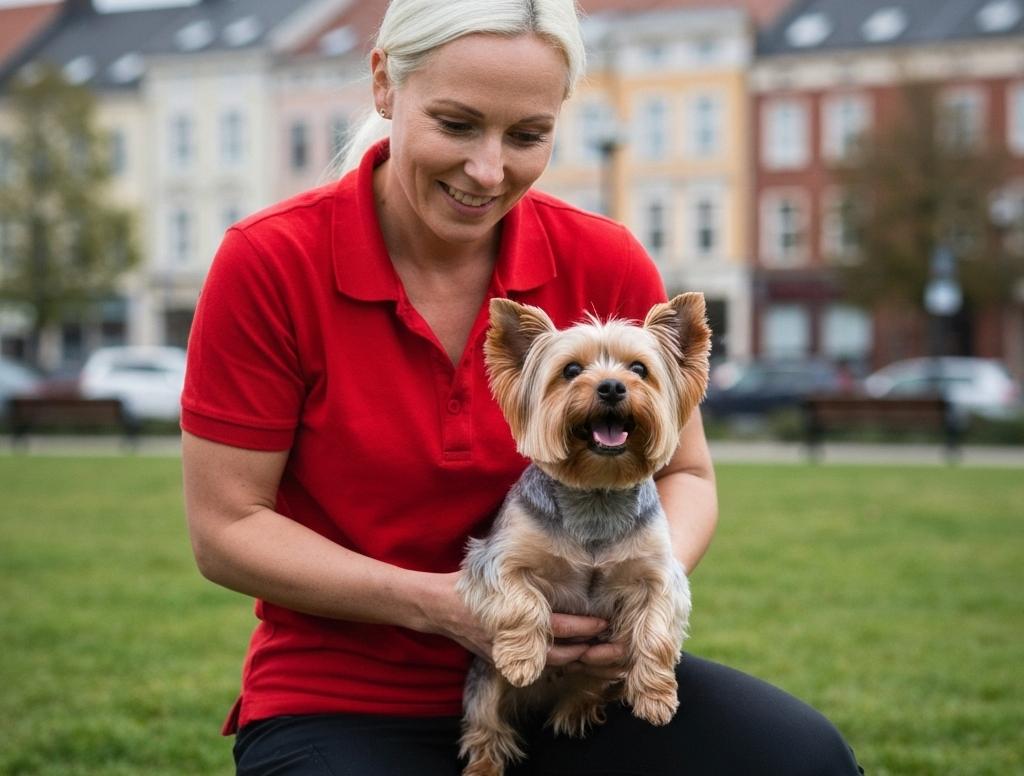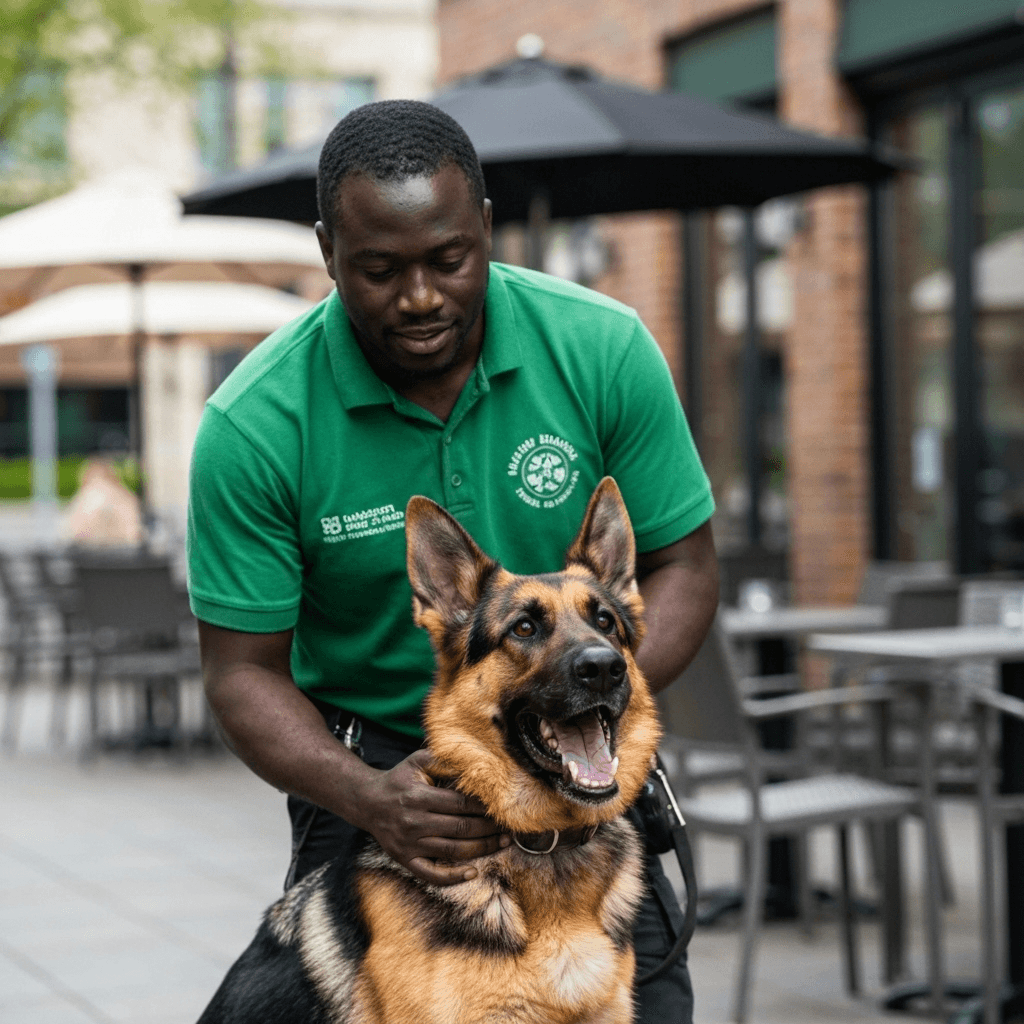Your Complete Guide to Choosing a Dog Trainer in Lancaster
When you’re walking your dog down Prince Street or through Central Market, you quickly realize that Lancaster life comes with its own challenges. Between the busy sidewalks, weekend crowds, and all those tempting food smells, your dog needs skills that work in the real world, not just in a quiet training room.
Finding the right trainer here in Lancaster County means looking for someone who understands what daily life looks like in the Red Rose City. Your dog will encounter everything from horse-drawn buggies to crowded farmers markets, and training should prepare them for all of it.
Finding Your Perfect Training Match
The best trainers in Lancaster use positive reinforcement methods because they work faster and build confidence instead of fear. Look for someone who’s comfortable working in busy places like Buchanan Park or Long’s Park, since that’s where your dog will need to actually use these skills.
Professional certifications tell you a lot about a trainer’s commitment to doing things right. Many Lancaster families look for credentials like KPA-CTP, CPDT-KA, or IAABC-CDBC. If you’re not sure what all those letters mean, you can check out this guide to dog trainer certifications to understand what each one covers.
When your dog has serious issues like aggression, severe anxiety, or a bite history, you’ll want someone with advanced behavioral credentials like CBCC-KA or CTC. These specialists have the experience to handle complex cases safely.
The right trainer will ask about your specific goals and create a plan that makes sense for your life. They should also explain exactly how you’ll practice skills in Lancaster’s real-world settings once your dog is ready.
Training Approaches That Actually Work

Most successful programs in Lancaster focus on building your dog’s confidence through positive experiences rather than intimidation or punishment.
Basic obedience covers the essentials like sit, stay, and polite leash walking that make neighborhood strolls enjoyable instead of stressful. Puppy training focuses on socialization during those critical early months, plus house training and crate comfort so your puppy grows into a well-adjusted adult dog.
When dogs have behavioral challenges, behavior modification programs use techniques like desensitization and counterconditioning to help them feel better about their triggers. In-home training brings the lesson right to your living room, which works especially well for house manners and greeting visitors.
Group classes give you budget-friendly options and controlled distractions for practice. Private lessons offer personalized attention when you need faster progress or have specific goals. Some trainers offer day training where they work with your dog during the week, though you’ll still need coaching sessions to learn the skills yourself.
Board and train programs can jump-start progress, but make sure they use humane methods and include plenty of owner education. The fanciest training in the world won’t help if you don’t know how to maintain it at home.
For specialized needs, service dog training and therapy dog training require trainers with specific experience and knowledge of legal requirements and testing standards.
What Training Actually Costs in Lancaster
Prices vary quite a bit depending on the trainer’s experience, travel distance, and what type of program you choose. Here’s what Lancaster County families typically pay based on recent surveys and trainer websites.
| Service Type | Average Cost (Lancaster Area) |
|---|---|
| Group classes, 4 to 6 weeks | $150 – $275 |
| Private lessons, 60 minutes | $90 – $160 per session |
| In-home private lessons | $110 – $180 per session |
| Puppy classes, 4 to 6 weeks | $150 – $275 |
| Day training, per week | $400 – $800 |
| Board and train, 2 to 4 weeks | $1,500 – $3,500 total |
| Behavior consult, initial | $120 – $220 |
Complex behavioral cases and trainers with advanced certifications typically cost more. Many offer package deals that bring the per-session price down, and some include a brief phone consultation to see if you’re a good fit.
The Right Questions to Ask Before You Commit
When you’re interviewing potential trainers, these questions will help you figure out who’s the real deal:
- What training methods do you use, and how do you handle it when dogs get stressed or shut down?
- What certifications do you have, and do you keep up with continuing education?
- Will I get a written training plan with clear goals and homework between sessions?
- Do you offer group classes, private lessons, or in-home training, and which would work best for my situation?
- How do you decide when my dog is ready to practice around distractions like other dogs or crowds?
- What exactly is included in your fee, and what are your policies on cancellations or travel charges?
- Do you carry liability insurance, and can you show me proof?
- For serious behavioral issues, do you work with veterinarians when medication might help?
Pay attention to how they communicate with you. If they can’t explain their methods clearly or seem to talk down to you, that’s probably how they’ll treat your dog too.
Local Resources Every Lancaster Dog Owner Should Know
Dog Parks and Off-Leash Areas:
- Beau’s Dream Dog Park at Buchanan Park has separate sections for different sized dogs and water features for hot days: Lancaster Rec
- Long’s Park Off-Leash Dog Area offers fenced play areas with convenient parking off Harrisburg Pike: Long's Park Foundation
- Overlook Dog Park in Manheim Township requires membership but provides well-maintained facilities: Manheim Township Parks
Legal Requirements:
- Lancaster County dog licenses are mandatory for dogs 3 months and older. You can get them online or at various locations: Lancaster County Dog Licenses
- Pennsylvania’s dog laws cover everything from leash requirements to dangerous dog regulations: PA Department of Agriculture
- Rabies vaccination is required statewide for dogs 3 months and older: PA Department of Health
Training Locations:
- Lancaster County Central Park has miles of trails perfect for leashed training walks: Lancaster County Central Park
Understanding Local Rules and Requirements
Lancaster has its own personality when it comes to dog regulations, and understanding them helps you train more effectively. Dogs must be under control in public spaces, and most parks require leashes except in designated off-leash areas.
Pennsylvania requires all dogs over 3 months to have current rabies vaccination and either an annual or lifetime license. Keep that license tag on your dog’s collar during walks because officers do check, especially in busy areas like downtown Lancaster.
The state doesn’t require special licensing for dog trainers, so they operate under general business licenses. Most professional trainers carry liability insurance, especially if they teach classes in public spaces or rented facilities. Some parks require permits for commercial training activities, so ask your trainer how they handle this.

Common Questions
What does in-home dog training cost in Lancaster?
Most in-home sessions in Lancaster run between $110 and $180, depending on how far the trainer has to travel and their level of experience.
Is in-home training worth the extra cost?
It’s often the fastest way to solve house-specific problems like jumping on visitors, stealing food, or separation anxiety since you’re working directly where the issues happen.
Can a trainer help with house training my dog?
Absolutely. Many trainers offer puppy packages that focus on house training, crate training, and establishing good routines, then teach you how to maintain progress.
What’s this 3-3-3 rule I keep hearing about?
It’s a guideline for newly adopted dogs – expect some chaos the first 3 days, settling in by 3 weeks, and real comfort by 3 months with consistent, positive structure.
How long will it take to see real progress?
Basic manners usually take 4 to 8 weeks with daily practice. Behavioral issues like fear or leash reactivity often need several months of consistent work.
What should I bring to my first group class?
Pack a properly fitted collar or harness, a regular 6-foot leash (not retractable), high-value treats, poop bags, water, and vaccination records if the trainer requests them.
What are Lancaster’s leash laws?
Dogs must be under control in public, and city and county parks require leashes except in designated off-leash areas. Each park posts specific rules at the entrance.
Do I really need a dog license in Lancaster County?
Yes, Pennsylvania requires current licenses for dogs 3 months and older, and Lancaster County enforces this. Keep the tag on your dog’s collar during walks.
What vaccinations are required in Pennsylvania?
Rabies vaccination is mandatory statewide. Your veterinarian will recommend others like distemper-parvo based on your dog’s lifestyle and local disease risks.
Are dog trainers licensed in Pennsylvania?
No special license is required for trainers in Pennsylvania. Look for professional certifications and ask about liability insurance and continuing education.
Where can I practice off-leash recall safely?
Use fenced dog parks like Beau’s Dream, Long’s Park, or Overlook. Start with a long training leash, then try off-leash once your dog is reliable inside the secure area.
Which local dog parks allow training?
All the major Lancaster County dog parks allow training as long as you follow park rules and don’t interfere with other users’ enjoyment.
Are there good trails for leashed training walks?
Lancaster County Central Park and many regional trails welcome leashed dogs. Visit during quieter times to build focus, then gradually add more distractions.
Making It Work in Lancaster
The key to successful training here is finding someone who uses kind, effective methods and understands what daily life looks like in Lancaster County. Whether you’re dealing with a puppy who needs to learn the basics or an older dog with behavioral challenges, consistency and patience will get you there.
Look for trainers with solid credentials, ask plenty of questions, and choose a program that fits your schedule so you can actually follow through. With the right guidance and regular practice in the places you actually go, you’ll end up with a well-trained companion who’s ready for everything Lancaster has to offer.
